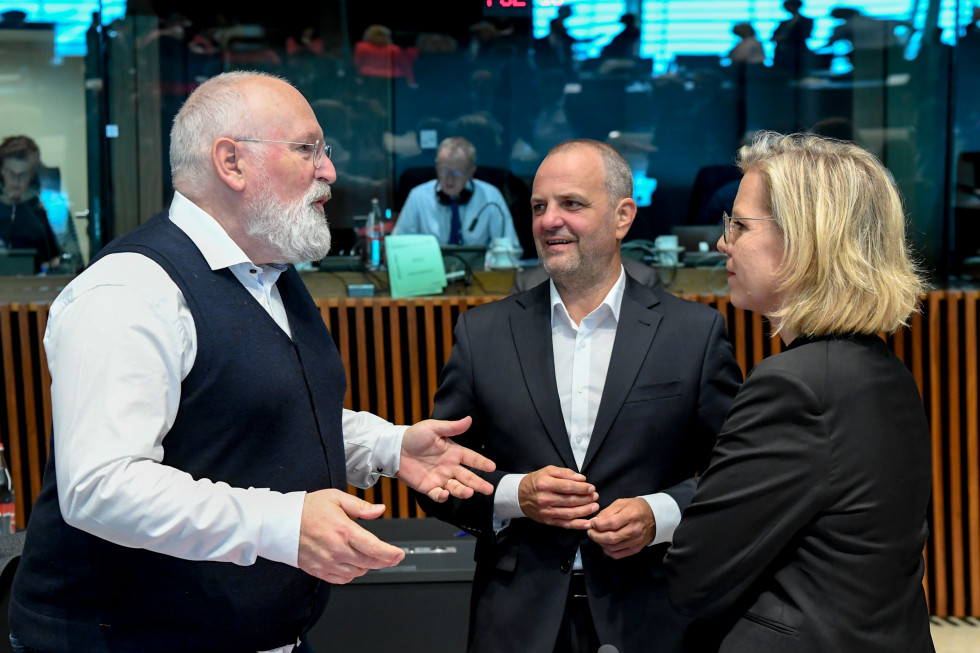Agreement reached at the first Environment Council meeting attended by minister Brežan about the legislative package “Fit for 55”
- Ministry of the Environment and Spatial Planning
On the basis of today's agreement, the new Czech Presidency of the EU Council will start negotiations with the European Parliament under the ordinary legislative procedure. Ministers also adopted a general approach on a proposal for a regulation on making available certain primary and other products related to deforestation and forest degradation.
Fit for 55 legislative package
Minister Brežan stressed that the proposal for action in the “Fit for 55” legislative package adequately addresses the climate challenge and the green transition. The package is an important element in addressing the challenges of the current energy crisis and contributes to making the EU more energy self-sufficient. “I also believe that the legislative package should be seen as a whole, as the compromise solutions in reaching the final agreement show. In the negotiations, we succeeded in making Slovenia a beneficiary of the Modernisation Fund. Around €300 million is expected to be available for modernising the energy system.” Today's agreement will pave the way for negotiations with the European Parliament.
The package introduces a new Emissions Trading System (ETS) pillar for road transport and buildings, and for maritime transport, and will also strengthen the functioning of the existing ETS, including the ETS for aviation. A specific Social Climate Fund is created to address the social challenges that the public will face as a result.
National targets for Member State efforts in non-ETS sectors (waste, agriculture, buildings, transport, small commercial installations) are increased in the burden sharing regulation (ESR). The LULUCF Regulation sets targets for carbon sinks at EU and national level and introduces stricter CO2 emission standards for passenger cars and light commercial vehicles.
Deforestation Regulation
Ministers also adopted a general approach on a proposal for a regulation on making available certain primary and other products related to deforestation and forest degradation.
It is important that the compromise proposal includes simplifications for natural persons and micro-enterprises. It is also important that the regulation has developed solutions for less rounding off of agricultural areas and for taking into account the specificities of agricultural areas regarding overgrowth.
The aim is to increase EU demand for and trade in non-deforestation products.
Therefore, the Regulation prohibits the placing on the EU market of the products concerned which would not comply with the provisions of this Regulation and which are not “deforestation-free”. The proposed Regulation replaces the existing Timber Regulation while extending it to a wider range of commodities - in addition to timber, palm oil, cocoa, coffee, soya and beef - and products, and requires compliance with the so-called “deforestation-free” criteria in addition to “legality”.
Waste shipments
The French Presidency presented a progress report on the negotiations on the proposal for a Regulation on shipments of waste. The main objective of the regulation is to better protect the environment and public health from the impact of illegal transboundary shipments of waste.
The Regulation will thus facilitate the shipment of waste within the EU for recycling and refurbishment and tighten requirements for the export of waste outside the EU. The establishment of a single electronic system within the EU is also very important.
Bilateral meeting with the Commissioner and the Austrian Minister
On the fringe of the meeting, Minister Brežan met with the European Commissioner for Environment, Oceans and Fisheries, Mr Virginijus Sinkevičius. They discussed environmental priorities: the regulation on batteries, waste shipments and industrial emissions, and the Commission's new proposal for a regulation on nature restoration. They also dealt with pending cases of Slovenian infringements of EU law. The Minister also met the Austrian Federal Minister for Climate, Environment, Energy, Transport, Innovation and Technology, Leonora Gewessler. They confirmed good cooperation and exchanged information on Slovenia's presidency of the Alpine Convention, which it takes over in October this year.


